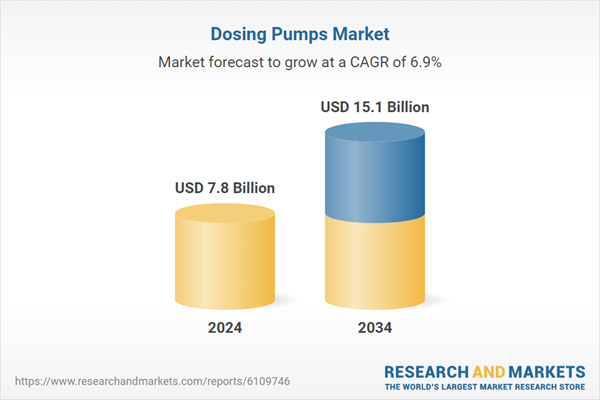Continuous innovation in dosing pump technology designed to handle highly viscous, corrosive, or abrasive chemicals is significantly expanding market opportunities across various industrial sectors. Advanced materials, such as reinforced polymers and corrosion-resistant alloys, are now being integrated into pump construction to improve durability and lifespan under extreme operating conditions. Additionally, enhanced sealing mechanisms, variable-speed drive compatibility, and precision flow control features enable these pumps to operate efficiently in challenging applications like mining, wastewater treatment, pulp and paper, and oil & gas. As industries seek to automate complex chemical dosing processes with minimal downtime and maintenance, demand for these rugged, high-performance dosing systems is rising steadily, opening new avenues for growth and product diversification.
The peristaltic dosing pumps segment is forecasted to reach USD 2.5 billion by 2034, driven by increasing demand from industries requiring hygienic fluid handling and contamination-free operation. Their sealed, non-invasive fluid pathways make them highly suitable for sectors like biotechnology, pharmaceuticals, and food production, where product purity is critical. The convenience of tool-free tubing replacement not only simplifies maintenance but also maximizes equipment uptime, reducing operational delays and minimizing labor intensity. As cleanroom compliance and product integrity remain top priorities in these industries, peristaltic pumps continue to gain ground for their ability to ensure sterile processing environments with minimal risk of cross-contamination.
The chemical processing dosing pumps segment is expected to reach USD 3.5 billion by 2034 as manufacturers seek durable, high-precision systems capable of handling aggressive fluids and hazardous chemicals. Their compatibility with closed-loop systems-designed to minimize vapor emissions and maximize workplace safety-makes them indispensable in chemical, petrochemical, and industrial manufacturing settings. These pumps are increasingly configured for continuous 24/7 use in high-capacity plants, where uninterrupted chemical dosing is vital to production efficiency. Their capacity to operate under extreme temperatures and pressures, coupled with automation readiness, makes them a preferred choice for demanding applications.
North America Dosing Pumps Market is expected to reach USD 3 billion by 2034, propelled by infrastructure upgrades and stricter environmental compliance mandates. As public utilities face mounting pressure to modernize outdated water treatment infrastructure, digital dosing pumps are rapidly replacing traditional mechanical systems. Enhanced precision in dosing chlorine, fluoride, and other treatment chemicals ensures regulatory alignment with evolving EPA standards. Utilities and industrial operators alike are prioritizing smart, networked pumps with remote monitoring and control capabilities, aligning with broader goals of sustainability, cost reduction, and public health protection.
Key players involved in the Global Dosing Pumps Market are Ark Electric & Mechanical, Blue White, Dosimix Technologies, Emec, Firemiks, Grundfos Holding, IDEX Corporation, Ingersoll Rand, IWAKI, KNAUER Wissenschaftliche Geräte, NETZSCH, Nikkiso, Phoenix Pumps, ProMinent, PSG, Roto Pumps, SEKO, SPX Flow, Verder Liquids, Verito Engineering, W.E.S. Manufacturers are investing heavily in digital innovation-integrating IoT connectivity, remote diagnostics, and auto-calibration features to meet demand for smart dosing solutions and reduce downtime. They are also developing corrosion-, heat-, salt-, and explosion-resistant pumps for demanding oil, gas, and industrial environments. Strategic growth tactics include forming partnerships with engineering firms and municipal utilities to pilot advanced systems, especially in wastewater and water treatment. Product portfolios are being expanded with peristaltic models tailored for food and biotech sterile applications, while closed-system chemical pumps ensure safety and compliance.
Comprehensive Market Analysis and Forecast
- Industry trends, key growth drivers, challenges, future opportunities, and regulatory landscape
- Competitive landscape with Porter’s Five Forces and PESTEL analysis
- Market size, segmentation, and regional forecasts
- In-depth company profiles, business strategies, financial insights, and SWOT analysis
This product will be delivered within 2-4 business days.
Table of Contents
Companies Mentioned
- Ark Electric & Mechanical
- Blue-White
- Dosimix Technologies
- Emec
- Firemiks
- Grundfos Holding
- IDEX Corporation
- Ingersoll Rand
- IWAKI
- KNAUER Wissenschaftliche Geräte
- NETZSCH
- Nikkiso
- Phoenix Pumps
- ProMinent
- PSG
- Roto Pumps
- SEKO
- SPX Flow
- Verder Liquids
- Verito Engineering
- W.E.S.
Table Information
| Report Attribute | Details |
|---|---|
| No. of Pages | 125 |
| Published | June 2025 |
| Forecast Period | 2024 - 2034 |
| Estimated Market Value ( USD | $ 7.8 Billion |
| Forecasted Market Value ( USD | $ 15.1 Billion |
| Compound Annual Growth Rate | 6.9% |
| Regions Covered | Global |
| No. of Companies Mentioned | 21 |









